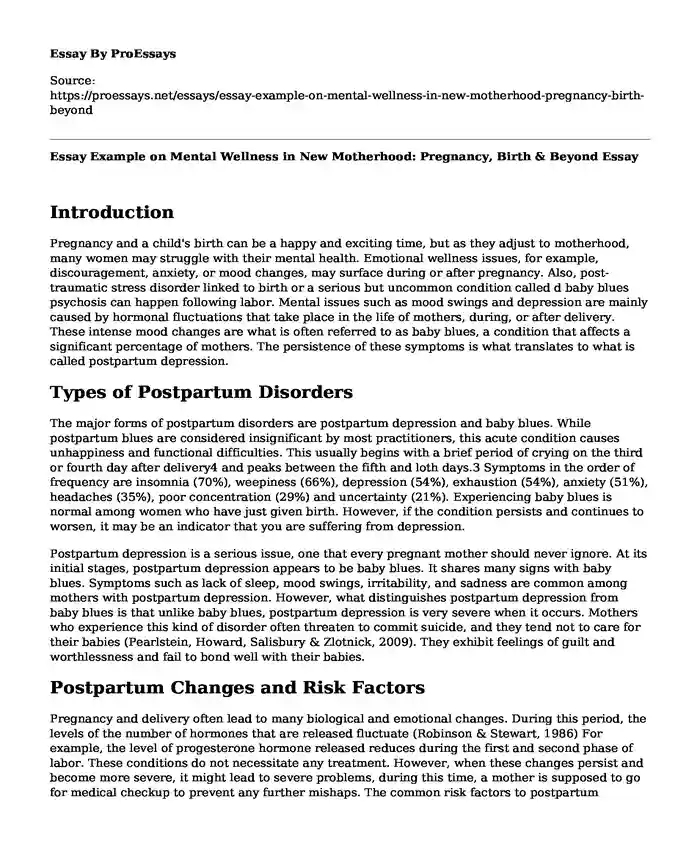Introduction
Pregnancy and a child's birth can be a happy and exciting time, but as they adjust to motherhood, many women may struggle with their mental health. Emotional wellness issues, for example, discouragement, anxiety, or mood changes, may surface during or after pregnancy. Also, post-traumatic stress disorder linked to birth or a serious but uncommon condition called d baby blues psychosis can happen following labor. Mental issues such as mood swings and depression are mainly caused by hormonal fluctuations that take place in the life of mothers, during, or after delivery. These intense mood changes are what is often referred to as baby blues, a condition that affects a significant percentage of mothers. The persistence of these symptoms is what translates to what is called postpartum depression.
Types of Postpartum Disorders
The major forms of postpartum disorders are postpartum depression and baby blues. While postpartum blues are considered insignificant by most practitioners, this acute condition causes unhappiness and functional difficulties. This usually begins with a brief period of crying on the third or fourth day after delivery4 and peaks between the fifth and loth days.3 Symptoms in the order of frequency are insomnia (70%), weepiness (66%), depression (54%), exhaustion (54%), anxiety (51%), headaches (35%), poor concentration (29%) and uncertainty (21%). Experiencing baby blues is normal among women who have just given birth. However, if the condition persists and continues to worsen, it may be an indicator that you are suffering from depression.
Postpartum depression is a serious issue, one that every pregnant mother should never ignore. At its initial stages, postpartum depression appears to be baby blues. It shares many signs with baby blues. Symptoms such as lack of sleep, mood swings, irritability, and sadness are common among mothers with postpartum depression. However, what distinguishes postpartum depression from baby blues is that unlike baby blues, postpartum depression is very severe when it occurs. Mothers who experience this kind of disorder often threaten to commit suicide, and they tend not to care for their babies (Pearlstein, Howard, Salisbury & Zlotnick, 2009). They exhibit feelings of guilt and worthlessness and fail to bond well with their babies.
Postpartum Changes and Risk Factors
Pregnancy and delivery often lead to many biological and emotional changes. During this period, the levels of the number of hormones that are released fluctuate (Robinson & Stewart, 1986) For example, the level of progesterone hormone released reduces during the first and second phase of labor. These conditions do not necessitate any treatment. However, when these changes persist and become more severe, it might lead to severe problems, during this time, a mother is supposed to go for medical checkup to prevent any further mishaps. The common risk factors to postpartum disorders include the previous history of mood swings, drug abuse, and marital issues.
Effect of Mothers' Depression On Infants and Treatment
A woman who suffers from depression may cause a risk to her children's socio-emotional and cognitive growth. The impacts of mothers' depression are not restricted to the early stage of child development but may extend to adolescence, pre-school age, and even school age. Subsequently occurring maternal depression affects the growth of the school-age child and adolescent. It has been documented that children of postnatally depressed mothers display patterns of dysregulated attention and excitement (Earls, M. F., & Committee on Psychosocial Aspects of Child and Family Health, 2010). Besides, when the bond between the mother and the child is weak, an infant may feel neglected, and this harms its cognitive development. Such children may also experience difficulty in associating with others when they reach the adolescent stage. Family therapy and psychoeducation interventions can be used among the affected kids.
Conclusion
Though postpartum disorders such as baby blues do not necessarily mean the mothers' health is at risk, the mother needs to visit her physicist when they emerge. Besides, family members should always be close when postnatal mothers begin to exhibit signs of these disorders. Providing emotional support to postpartum mothers when experiencing depression would significantly help.
References
Earls, M. F., & Committee on Psychosocial Aspects of Child and Family Health. (2010). Incorporating recognition and management of perinatal and postpartum depression into pediatric practice. Pediatrics, 126(5), 1032-1039. https://pediatrics.aappublications.org/content/126/5/1032.abstract
Pearlstein, T., Howard, M., Salisbury, A., & Zlotnick, C. (2009). Postpartum depression. American journal of obstetrics and gynecology, 200(4), 357-364. https://www.sciencedirect.com/science/article/abs/pii/S0002937808022710
Robinson, G. E., & Stewart, D. E. (1986). Postpartum psychiatric disorders. CMAJ: Canadian Medical Association Journal, 134(1), 31. https://www.ncbi.nlm.nih.gov/pmc/articles/PMC1490588/
Cite this page
Essay Example on Mental Wellness in New Motherhood: Pregnancy, Birth & Beyond. (2023, Feb 21). Retrieved from https://proessays.net/essays/essay-example-on-mental-wellness-in-new-motherhood-pregnancy-birth-beyond
If you are the original author of this essay and no longer wish to have it published on the ProEssays website, please click below to request its removal:
- Awareness of Light
- The SSI Federal Income Program - Paper Example
- Functional Health Pattern Analysis Worksheet Paper Example
- Essay Sample on Nutritional Supplement
- Essay Example on State's Child Welfare System: Challenges & Solutions
- Ivan Pavlov: Father of Classical Conditioning and Behaviorism - Essay Sample
- Essay Example on Debate: Is Studying Law a Guarantee for Success?







